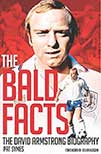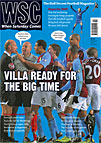Search: 'Ray Wilkins'
Stories
 The David Armstrong biography
The David Armstrong biography
by David Armstrong
with Pat Symes
Pitch Publishing, £17.99
Reviewed by Harry Pearson
From WSC 324 February 2014
There was always something a little Dickensian about Middlesbrough and Southampton midfielder David Armstrong. Small, prematurely bald, slightly portly with a face that fell naturally into an expression of melancholy, he was more Oliver Twist than the 1970s footballer of popular mythology. Even his nickname Spike has a whiff of the Victorian workhouse about it.
The nickname, it transpires, was given to him by Middlesbrough team-mate Basil Stonehouse for no other reason than that Stonehouse thought someone in the squad should have it. It’s the kind of anticlimactic tale that seems to have characterised Spike’s career. A hard-working left-sided player and an excellent passer and crosser, Armstrong scored over 100 goals from midfield and was so robust at times he seemed indestructible (he made 356 consecutive appearances for Boro).
He was not a dribbler though, nor was he quick, both of which counted against him when it came to international honours – he was only capped twice by his country. Trophies too eluded him. At Ayresome Park Jack Charlton’s reluctance to spend money – faced with a choice between Trevor Francis or Alf Wood, Big Jack opts, naturally, for the latter – scotches Middlesbrough’s chances of silverware, while Southampton fall agonisingly short of a Double in 1983-84 with Armstrong playing in all 51 games.
While other footballers’ autobiographies are often brimming with bitterness or rancour, The Bald Facts is tinged with sadness and regret. Armstrong’s career ended by an ankle injury that was treated in so bungling a manner the player is barely able to stand up for several years, his finances in tatters, you come away from reading it with the impression that the midfielder feels let down, not necessarily by individuals, but by the game itself.
As is too often the case the player’s unworldliness has hardly helped his cause. You don’t need to be a genius to realise that when you are going to court for an alimony hearing driving into the car park in a brand new red Mercedes is not the best idea. That’s what Armstrong does though. The results are predictable – his wife gets the house and whacking great yearly maintenance payments. “I came out of that court and burst pathetically into tears,” Spike records. There are a lot of tears in these pages, the odd laugh too, and a rather puzzling story about dognapping and Joe Laidlaw. Ultimately though there’s a sense of promise unfulfilled and of tales half told.
I started reading The Bald Facts during the hullabaloo that followed FA chairman Greg Dyke’s comments on the number of foreign players in the Premier League weakening the national team. Armstrong, of course, played when there were very few non-British professionals in the English top flight so it is instructive to see the midfield Ron Greenwood selected for the game against West Germany in 1982. Alongside Armstrong were Alan Devonshire, Ricky Hill and Ray Wilkins. Is that the sort of line-up that would strike fear into the hearts of the current Spanish, German or Brazilian sides?
 Georgina Turner is sick and tired of an inane background hum – constant chirrupings from the extra in the commentary box
Georgina Turner is sick and tired of an inane background hum – constant chirrupings from the extra in the commentary box
“I’ve got to say that to get away with that in such a hostile environment, you’ve got to count your chickens” – the wisdom of Ray Wilkins, following Peter Crouch’s second bookable tackle early in the first leg of Real Madrid v Tottenham Hotspur.
 Dear WSC
Dear WSC
Bruce Wilkinson (WSC 267) pointed out that ticket queues “seem a quaint ritual of a bygone age”. Waiting in a virtual internet queue bears no similarity to lining up outside the box office. I have my tickets for the FA Cup final, but I do not feel as if I earned them. Instead of getting up in the middle of the night, crossing London, losing half a day’s work, standing in the rain shuffling forward inch by inch while nervous that there are too many punters and too few tickets, I merely sat in my dressing-gown in front the PC. There is no one to talk to in the “virtual waiting room”. Your opportunity is allotted randomly. Suddenly it’s all over and you have what you came for. One should be happier as the process is simple and efficient and the desired result achieved, but somehow it feels like a hollow victory as it lacks the sense of accomplishment joy and triumph of the old-fashioned process. You can’t even wave the tickets in triumph above your head as they are sent by post.Obviously my complaining about the changes that actually improve my life marks me down as “old”. I am not asking to bring back rickets and polio and to repeal the Factory Acts but I do miss a modicum of discomfort and inconvenience. The old experience was akin to standing on the terraces or being subject to the over-zealous policing that used to mark us out as a tribe. Under the new regime the tickets are yours if your broadband speed is faster and your credit card more golden than the next, rather than if you have more commitment stamina and perseverance.Will the ultimate progress be when we treat football like theatre and opera by dressing-up smartly for the occasion and ordering our interval drinks? Or is that Club Wembley?
Patrick Sheehy, London
 Some are wild cards, some club stalwarts. Jon Spurling looks at the life of the acting manager
Some are wild cards, some club stalwarts. Jon Spurling looks at the life of the acting manager
Newcastle and Sunderland rarely admit to having anything in common, yet the clubs’ recent moves to formalise the positions of Joe Kinnear and Ricky Sbragia represents a rare moment of triumph for caretaker managers. The fact that both clubs hankered after bigger names suggests that neither man’s position is secure, but at least they are likely to emerge with their self respect intact, unlike many hapless interim appointments.